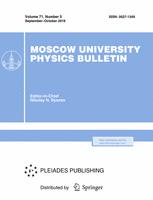We study phase trajectories in a system with Benard-Rayleigh convection computed by tracing of ideal massless particles in a flow. The velocity of each particle at any moment coincides with the speed of the fluid at the same point. The presented method allows to obtain phase trajectories of the fluid control volumes using the solution of the Navier-Stokes equations. For the Rayleigh number 220 000, the presence of two types of phase trajectories is established, one of which corresponds to the rotation around equilibria centres and is related to the motion inside convective rolls. The second group of particles relates to the chaotic movement of the hottest and coldest fluid at the boundaries. The difference between the phase portraits of a system with Benard-Rayleigh convection when describing the Navier-Stokes equations and the Lorentz system is analyzed.
51.90.+r Other topics in the physics of gases
$^1$Belarusian State University, Physics Faculty\
$^2$International Intergovernmental Organization Joint Institute for Nuclear Research, Veksler and Baldin Laboratory of High Energy Physics



